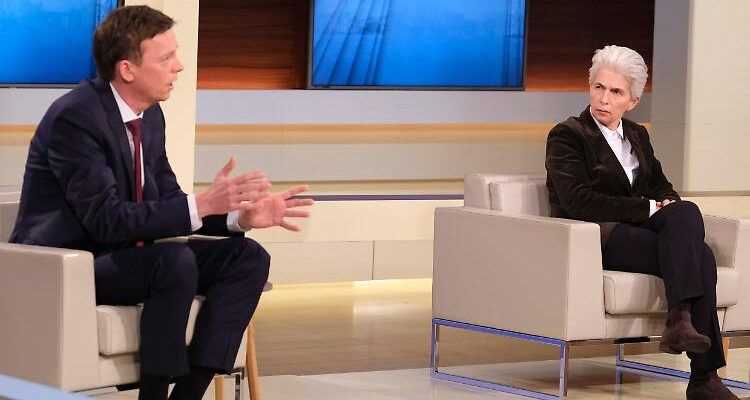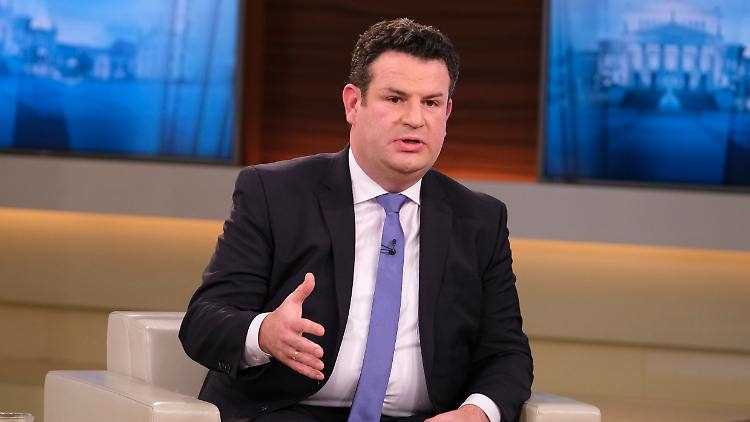Take action as early as possible: This approach has proven itself in the pandemic. But recently politicians found it difficult to resolutely fight the fourth corona wave. Did the past week turn things around? “Anne Will” discusses this with her guests.
In a few days, the next sad record of the pandemic is imminent. Then it is proven that more than 100,000 people in Germany will have died as a result of Covid-19. And just as the number of new infections reported daily has risen dramatically in the past few weeks, the number of registered deaths will continue to rise rapidly. This development can no longer be stopped, as the head of the Robert Koch Institute, Lothar Wieler, recently declared relentlessly. The only question that now arises is: Which measures can contain the new infections, relieve the health system and ultimately save human lives?
For the 35th time since the beginning of the pandemic, presenter Anne Will asked her guests on Sunday evening to assess the current corona situation in order to answer exactly this question. Despite the changing studio line-up, it is clear after around 60 minutes that there are many problems, including some possible solutions, but in the end the viewer does not get really smart.
The program begins by expressing a feeling that many people are likely to share right now: frustration. Anne Will asks the virologist Melanie Brinkmann how she thinks that Germany is currently in a real corona emergency again, despite early warnings from science. She was “incredibly frustrated,” said Brinkmann. Even in the second year of the pandemic, the Braunschweig professor feels obliged to explain what exponential growth means in terms of the number of cases. She takes the example of a football stadium into which a raindrop falls. The next day it’s two drops, then four, then eight, and so on. On the 42nd day the stadium is half full. One day later, entirely.
This creeping process may not initially be visible to the naked eye. But with regard to Sars-CoV-2 and with the help of corresponding model calculations, the seriousness of the situation could have been foreseen as early as the summer. Probably also have to foresee. The present politicians are confronted with precisely this accusation. “I wouldn’t be inclined to say that we did everything 100 percent right,” said Saarland Prime Minister Tobias Hans. “Those of us who are not to blame, throw the first stone,” says Labor Minister Hubertus Heil. Both politicians defend the recently adopted measures, which are set out in the new Infection Protection Act of the traffic light coalition, or were agreed in the federal-state round on Thursday. Around 3G at work and on public transport as well as the obligation to work from home.
The problem is the unvaccinated
The Saarland Prime Minister Tobias Hans and FDP politician Marie-Agnes Strack-Zimmermann
(Photo: NDR / Wolfgang Borrs)
CDU politician Hans explains that the number of infections rose so massively in November that the protective effect of the vaccination waned so early – none of this was expected. His SPD colleague Heil uses the airtime to appeal again to the population to get vaccinated or boosted. He is convinced of the latest decisions. All instruments are now in place to respond adequately to this fourth wave, “but we now have to implement them consistently – in concert with the state, society and citizens.”
But is the said instrument case really as effective as hoped? Virologist Brinkmann is skeptical. The booster vaccination is important and correct for the elderly. But: “The main problem is the high rate of non-vaccinated people. They are driving the numbers right now.” The psychologist Cornelia Betsch provides scientific support in the discussion group. She sums up the problem as follows: “In nine out of ten infections, unvaccinated people are involved, either as contagious or infected or both.”
Just like that Charité virologist Christian Drosten the two scientists are convinced that the vaccination gap must be closed. In other words: those who have not yet been immunized must be convinced to get vaccinated. “The problem is always time and time is running out,” says Brinkmann. And that’s why the presenter Anne Will asks about the compulsory vaccination in this program. Brinkmann welcomes the fact that this should come for professional groups that have contact with vulnerable groups. But in view of the sheer group size of the unvaccinated, that is only a drop in the ocean.
Labor Minister Heil considers the debate about a general vaccination requirement, as it should come in Austria, to be premature. This could only be discussed if there was a concept of how this obligation could be implemented in a legally secure manner. Psychologist Betsch, on the other hand, sees a nascent preference for it. In her opinion, the subject must be removed from the taboo.
A “window of readiness to act”
Betsch is professor for health communication at the University of Erfurt and head of the “Covid-19 Snapshot Monitoring” (COSMO), which, roughly speaking, has been dealing with the state of the population in a global pandemic since last year. The evaluation of citizen surveys showed that a “window of willingness to act” opens as soon as the number of cases increases and the risk perception increases accordingly. People would become more cautious and more receptive to vaccination calls. There is only a problem of trust if there is no reaction from politics to a more dramatic infection and measures are a long time coming.
Politicians have to start thinking about what will happen if the fourth wave is actually broken, explains Betsch. Because even then a significantly higher vaccination rate is required. Boosters alone are not enough, because the current rate of around 68 percent fully vaccinated would have been sufficient for the original variant of Sars-CoV-2, but it is not for the delta mutant, which is so much more infectious, says Brinkmann. But this has already been warned.
Meanwhile, FDP politician Marie-Agnes Strack-Zimmermann is doing something completely different. “I believe that we have social upheaval in a form where we will notice what is happening for years to come.” She reports on students who have never seen a university from the inside and seniors who have lost touch with the outside world. The defense politician tries to create a military image. You are worried about the “resilience” of the people. “What if there is an attack on us, and that is de facto one, that we no longer have the strength to move closer together, but rather have such a rejection,” she explains. These human problems should not be ignored in all of the health challenges.
In places like these, the broadcast frays. Moderator Will is unable to capture the many anecdotes from her guests. In the end, Strack-Zimmermann has to abruptly tear her out of her thoughts and ungalant lead on to the “topics of the day”. It’s not nice to watch. But what is nice in the current virus misery?

